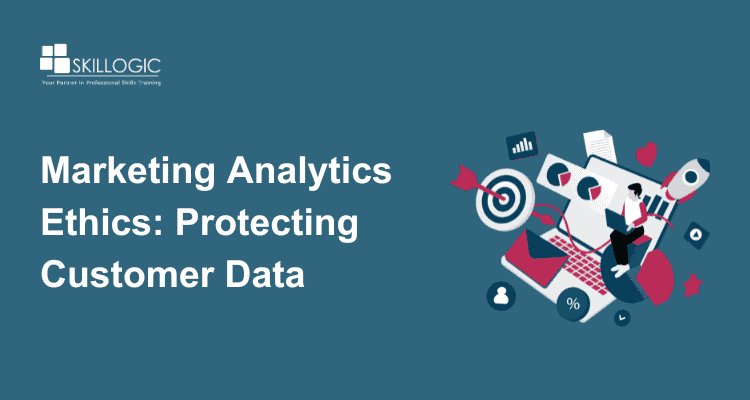The Ethics of Marketing Analytics: Protecting Customer Data
The Ethics of Marketing Analytics emphasizes the responsible collection, use, and protection of customer data to build trust and safeguard privacy. It ensures that businesses can succeed while adhering to ethical standards and maintaining customer confidence.

In today’s world, businesses rely heavily on data to understand their customers, improve marketing strategies, and grow. Marketing analytics helps companies use this data effectively, but it also raises serious ethical concerns. These concerns are about how customer information is collected, used, and kept safe. The Ethics of Marketing Analytics is all about using data in a way that builds trust and protects people’s privacy while helping businesses succeed.
The Importance of Ethics in Marketing Analytics
Ethics in marketing analytics refers to the principles and practices that govern the responsible use of customer data. It involves ensuring transparency, fairness, and accountability in how data is collected, processed, and utilized. Inappropriate handling of customer information can lead to breaches of trust, reputational damage, and even legal penalties. For instance, businesses must navigate complex ethical dilemmas, such as balancing targeted advertising with respecting individual privacy.
As professionals embark on a career in this field, pursuing a marketing analytics course or business analytics course equips them with the technical and ethical knowledge required to handle data responsibly. These courses often include real-world examples and case studies that highlight the importance of ethical decision-making.
Growing Demand for Marketing Analytics Professionals
The demand for marketing analytics professionals is rapidly increasing as companies continue to embrace data-driven strategies. These roles require not only technical skills but also a deep understanding of ethical practices to ensure regulatory compliance and build customer trust. Organizations are actively seeking candidates who have certifications from marketing analytics training or business analyst courses to meet this growing demand. The marketing analytics market has expanded significantly in recent years. According to research from ResearchandMarkets, it is expected to grow from $4.56 billion in 2023 to $5.35 billion in 2024, with a compound annual growth rate (CAGR) of 17.4%.
In India, the average salary for marketing analytics professionals is approximately INR 9.4 Lakhs per annum, as per AmbitionBox, highlighting the growing demand and value for these skills. Internationally, the compensation for marketing analytics roles varies significantly. In the United States, the average salary is around $70,503, according to Indeed. In South Africa, professionals in this field earn approximately R288,370, as reported by Payscale. Meanwhile, in the UAE, the average salary is AED 58,366, as per Indeed. These figures underscore the global recognition of the expertise required in marketing analytics, with a particular emphasis on understanding data ethics, which has become a crucial component of professional training.
Steps to Master the Ethics of Marketing Analytics
Learning about the ethics of marketing analytics involves more than just understanding laws and regulations. It requires a comprehensive approach:
- Understanding Core Concepts: Professionals must grasp essential principles such as data privacy, consent, and confidentiality. Marketing analytics courses often introduce these concepts alongside technical skills.
- Leveraging Learning Resources: Many business analytics courses and marketing analytics training programs provide access to resources like case studies, industry insights, and ethical guidelines. These tools help learners contextualize theoretical knowledge into practical scenarios.
- Hands-On Experience: Internships or project-based learning opportunities offered by a business analyst course enable learners to face real-world challenges. By applying ethical principles in a practical setting, professionals can refine their decision-making skills.
- Staying Updated on Regulations: Laws such as the General Data Protection Regulation (GDPR) and the California Consumer Privacy Act (CCPA) set benchmarks for data ethics. Professionals must keep themselves informed about these regulations to remain compliant.
Best Practices for Ethical Marketing Analytics
To ensure ethical practices in marketing analytics, businesses and professionals can adopt several best practices:
- Transparency: Clearly communicate to customers how their data will be used and ensure they provide informed consent.
- Data Minimization: Collect only the data that is absolutely necessary for specific marketing objectives.
- Confidentiality: Use advanced security measures to protect customer data from breaches or unauthorized access.
- Compliance with Regulations: Adhere to legal frameworks like GDPR and CCPA to maintain customer trust and avoid penalties.
- Ethical Audits: Regularly review marketing campaigns to identify potential ethical issues and address them promptly.
These practices are often reinforced during marketing analytics training, ensuring that professionals are well-prepared to handle ethical challenges in their careers.
The Ethics of Marketing Analytics is more than a buzzword; it is a necessity in today’s data-driven world. By prioritizing transparency, customer consent, and regulatory compliance, businesses can build trust and foster long-term relationships with their customers. For professionals, gaining expertise through a marketing analytics course, business analytics course, or business analyst course can provide the skills and ethical foundation needed to excel in this field. As the industry continues to evolve, ethical practices will remain a cornerstone of effective and responsible marketing analytics.
SKILLOGIC Institute offers in-depth training programs designed to boost skills and accelerate career growth. With over ten years of experience and a strong reputation for excellence, SKILLOGIC specializes in certification courses across a range of fields, including Six Sigma, PMP, Cybersecurity, and Business Analytics. As a prominent SKILLOGIC Business Analytics Institute, it is committed to delivering high-quality education, led by experienced trainers who provide practical, real-world insights. With offline centers in major cities like Bangalore, Chennai, Pune, and Hyderabad, SKILLOGIC ensures that learners across India have easy access to top-tier education. Whether you're aiming to advance in your current profession or pivot to a new career, SKILLOGIC Institute offers the resources and support you need to achieve your goals.

0
209